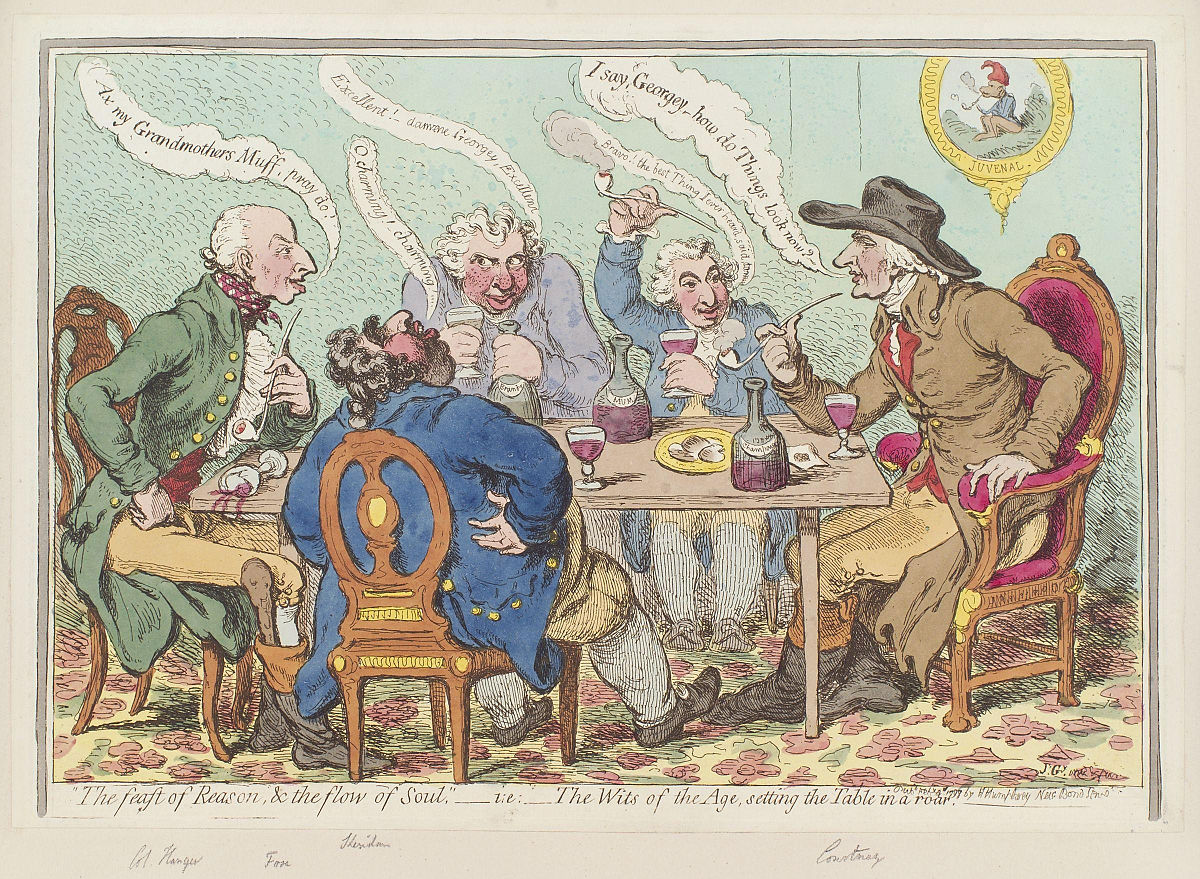What links these seven words: vulnerable, entitlement, diversity, transgender, fetus, evidence-based and science-based. Continue reading
Category Archives: In the news …
In the news: is British irony stopping the Brits from being understood by non-native English-speakers?

‘The feast of Reason, & the flow of Soul’ – i.e. – The Wits of the Age, setting the Table in a roar, by James Gillray / Wikimedia Commons
“The British are proud of the idiomatic humour of their language. But an academic has argued that they are actually falling behind because they insist on using phrases that the rest of the world does not understand.” The Telegraph has the full story.
“Not only did the British keep to themselves but they also said that they [a group of Hungarian, German and Italian students] get along very well, they understand each other, and the only trouble comes when a really British person comes and joins the conversation.”
Sorry! — Ed.
***
In the news: The clown & Comic Sans
Trump’s Lawyer Issues Press Release In Comic Sans, and Learns The Hard Way That No One Should Use That Font. Bored Panda has the whole comic story, sans irony.
***
Some French misogyny in the news (and it’s not moi aussi …)
There are two French-accented items in the news this week: one about the inherent sexism of French grammar, and the other about a particular kind of Frenglish (or is it Franglais?), which you’re likely to hear when you’re north of the border … Continue reading
In the news: the fate of German’s longest word
“The German language has lost its longest word thanks to a change in the law to conform with EU regulations. Rindfleischetikettierungsueberwachungsaufgabenuebertragungsgesetz – meaning “law delegating beef label monitoring” – was introduced in 1999 in the state of Mecklenburg-Western Pomerania. It was repealed following changes to EU regulations on the testing of cattle.” The BBC has the full story (including the name of these very long words that are so common in German …).
***
The ultimate dangling modifier …
In the news … Қазақстан to Qazaqstan?
“The Kazakh language has long been unsure which alphabet to find a comfortable home in and it’s now in for another transition – but this is not without controversy. Last Friday Kazakh President Nursultan Nazarbayev finally decreed that the language would shed its heavy Cyrillic coat and don what he hopes to be a more fashionable attire: the Latin alphabet.” The BBC has the story.
***
In the news: A spelling fail in the Prat(t) Tribune …
A headline on Saturday in the (appropriately named) Pratt Tribune (sic). As reported by Mashable and others. And yes, there is a paper with that name (although Brits won’t believe it.) At least it has a double ‘t’…
***
Bus, buses, busses
According to Grammarist:
“Notwithstanding Great Caesar’s assertion regarding ‘busses’ as being a kiss (an archaic definition retained only in very few dialects), busses is commonly accepted as the correct form for the verb ‘to bus’ as in he/she/it busses. Buses is the plural of the noun ‘bus’.”
You can hear the singular “buss” in this song, ‘Spin on a Red Brick Floor’: take it away, Nanci Griffith:
Busses,
Glosso
xoxo
Hat tip to Rona
In the news … The importance of good spelling (in dating and in life)
Spelling is important. It can affect your chances of getting a job, your love life, and it can make us appear less intelligent than we are. A recent BBC article spells it all out for us.
“Research shows that as soon as people spot a spelling mistake on a website they’ll often leave it because they fear it’s fraudulent.
Corporations are aware that a portion of their image rests upon correct writing and spelling, says Roslyn Petelin, associate professor in writing at the University of Queensland in Australia. ‘Nothing can make you lose credibility more quickly and seem uneducated than a spelling mistake, and that includes apostrophes,’ she says.
… Indeed, a lack of a certain level of proficiency may be a barrier to getting a job at all. A lot of employers in Australia now ask candidates to take writing tests, says Petelin. ‘Young people coming out of university may have all the right interpersonal skills, but if they can’t write coherently, employers won’t give them a job.’
Poor spelling can even affect your dating chances. A Match.com survey found that 39% of singles judged the suitability of candidates by their grammar.”
Read the full story at the BBC.
***









